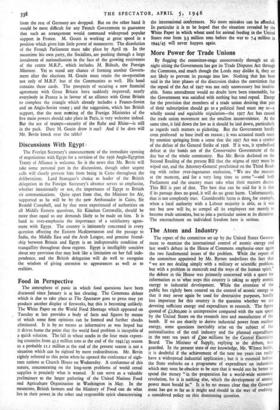The Atom and Industry
The report of the committee set up by the United States Govern- ment to examine the international control of atomic energy and last week's debate in the House of Commons emphasise once again the two fundamental issues of the problem. While the report of the committee appointed by Mr. Byrnes underlines the fact that "we are not dealing simply with a military or scientific problem, but with a problem in statecraft and the ways of the human spirit," the debate in the House was primarily concerned with a quest for information as to what steps this country is taking to apply atomic energy to industrial development. While the attention of the public has rightly been centred on the control of atomic" energy so that it may never again be used for destructive purposes, hardly less important for this country is the question whether we are devoting sufficient energy and expenditure to research. The figure quoted of £2,800,000 is unimpressive compared with the sum spent by the United States on the research into and manufacture of the bomb. If we are shortly to derive industrial power from nuclear energy, some questions inevitably arise on the subject of the nationalisation of the coal industry and the planned expenditure in the next ten years of L300 millions by the Central Electricity Board. The Minister of Supply, replying to the debate, was guarded. In the present state of our knowledge, Mr. Wilmot holds, it is doubtful if the achievement of the next ten years can really have a widespread industrial application ; but it is essential before the State embarks on a programme of expenditure on industries which may soon be obsolete to be sure that it would not be better to spend the money " in the preparation for a world-wide economic revolution, for it is nothing else, which the development of atomic power must herald in." It is by no means clear that the Governs ment has got as far as it might and should in the way of evolving a considered policy on this dominating question.






























 Previous page
Previous page